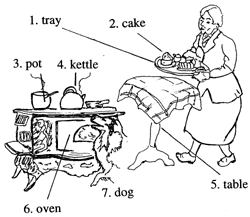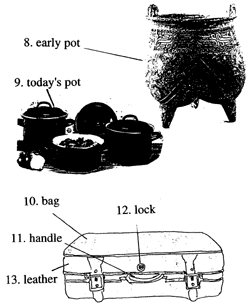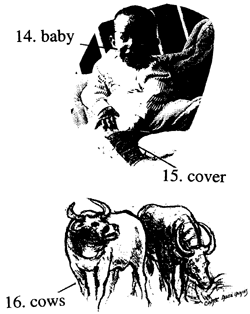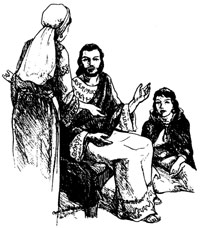Unit 17: The Imperative
El Imperativo
Pictured Words
Palabras Representadas
New Words
Nuevas Palabras

| 1. tray
bandeja |
| 2. cake
torta |
| 3. pot
pote |
| 4. kettle
caldera |
| 5. table
tabla |
| 6. oven
horno |
| 7. dog
perro |

| 8. early pot
pote temprano |
| 9. today's pot
pote de hoy |
| 10. bag
bolso |
| 11. handle
manija |
| 12. lock
cerradura |
| 13. leather
cuero |

| 14. baby
bebé |
| 1 cover
cubierta |
| 16. cows
vacas |
Nouns
Sustantivos
animal
cocinero
experiencia
aceite
atención
cuidado
experto
pote
bebé
condición
amigo
razón
comportamiento
detalle
armonía
petición
negocio
efecto
pérdida
olor
Adjectives
Adjetivos
completo - sepárese
normal
lento
diferente
tranquilidad
responsable
falso
serio
cansado
Sayings
Refranes
The cook is putting her cakes on the table.
El cocinero la está poniendo las tortas en la tabla.
Meat is cooking in the pot.
La carne está cocinando en el pote.
Early pots were designed for standing in the fire.
Los potes tempranos fueron diseñados para estar parado en el fuego.
Big bags are necessary for a long journey.
Los bolsos grandes son necesarios para un viaje largo.
We put our coats on our backs, not in the bag.
Pusimos nuestras capas en nuestras partes posterioras, no en el bolso.
The baby is smiling and very happy.
El bebé está sonriendo y muy feliz.
She can see cows outside the window.
Ella puede ver vacas fuera de la ventana.
Cows are animals that must have grass frequently .
Las vacas son los animales que deben tener hierba con frecuencia.
The Imperative
El Imperativo
In the two stories, "On a very hot day" and "The boy with the barley cakes and fish", our attention is got by giving orders.
En las dos historias, "en un día muy caliente" y "el muchacho con la cebada se apelmaza y el pescado", nuestra atención es conseguido dando órdenes.
These orders are called the imperative of the verb.
Estas órdenes se llaman el imperativo del verbo.
Examples are
Los ejemplos son
he gave orders and said: take up your son.
él dio órdenes y dijo: tome a su hijo.
send for her.
envíe para ella.
do not say what is false.
no diga cuál es falso.
take him in to his mother.
llévelo adentro a su madre.
send me one of the servants.
envíeme a uno de los criados.
let the people be seated.
deje a gente ser asentado.
take up the broken bits which are over.
tome los pedacitos quebrados que encima.
The simple verb is used without any changes.
El verbo simple se utiliza sin ningunos cambios.
This a way of giving force to the statement and giving it the sound of an order to the hearer.
Esto una manera de dar la fuerza a la declaración y de darle el sonido de una orden al oyente.
It may also be in the negative, as in the statement :
Puede también estar en la negativa, como en la declaración:
do not say what is false.
no diga cuál es falso.
The negatives of the above statements would have been:
Las negativas de las declaraciones antedichas habrían sido:
he gave orders for the woman and said: do not take up your son
él dio las pedidos para la mujer y dijo: no tome a su hijo
do not send for her.
no envíe para ella.
do not take him to his mother.
no lo lleve a su madre.
do not send me one of the servants.
no me envíe a uno de los criados.
do not let the people be seated.
no deje a gente ser asentado.
do not take up the broken bits which are over.
no tome los pedacitos quebrados que encima.
In these forms the words “do not” are used to change the sense from positive to negative.
En estas formas que no lo hacen las palabras se utilizan cambiar el sentido de positivo a la negativa.
The verb "let" is quite usually used to say soft orders:
El verbo "dejó" se utiliza absolutamente generalmente decir órdenes suaves:
let the people be seated.
deje a gente ser asentado.
It is still an imperative but it is a soft order.
Sigue siendo un imperativo pero es una orden suave.
Some examples from the story would be:
Algunos ejemplos de la historia serían:
let the rest be for the needs of yourself and your sons.
deje el resto estar para las necesidades de se y de sus hijos.
let us make a little room on the wall.
hagamos un poco cuarto en la pared.
let her be, for her soul is bitter in her.
déjela ser, porque su alma es amarga en ella.
The words "let us" only make a suggestion.
Las palabras "nos dejaron" solamente hacer una sugerencia.

Two Sisters
Dos Hermanas
While they were on their way, he came to a certain town;
Mientras que estaban en su manera, él vino a cierta ciudad;
and a woman named Martha took him into her house.
y una mujer nombrada Martha lo tomó en su casa.
And she had a sister, by name Mary, who took her seat at the Lord's feet and gave attention to his words.
Y ella tenía una hermana, por nombre Maria, que tomó su asiento en los pies del señor y dio la atención a sus palabras.
But Martha had her hands full of the work of the house, and she came to him and said, Lord, is it nothing to you that my sister has let me do all the work?
¿Pero Martha la tenía las manos por completo del trabajo de la casa, y ella vino a él y dijo, Señor, no es él nada a usted que mi hermana tiene me dejó hacer todo el trabajo?
say to her that she is to give me some help.
diga a ella que ella debe darme una cierta ayuda.
But the Lord, answering, said to her, Martha, Martha, you are full of care and troubled about such a number of things: Little is needed, or even one thing only: for Mary has taken that good part, which will not be taken from her.
Pero el señor, el contestar, dicho ella, Martha, Martha, usted es lleno de cuidado y se preocupa sobre tales un número de cosas: Poco es necesaria, o aún una cosa solamente: para Maria ha tomado esa buena parte, que no será tomada de ella.
Additional Reading
Lectura Adicional
The two sisters were Mary and Martha, and they had a brother.
Las dos hermanas eran Maria y Martha, y tenían un hermano.
His name was Lazarus.
Su nombre era Lazarus.
You will have in mind that he was the one whom Jesus made to come back from the dead.
Usted tendrá en mente que él era el quién Jesús hecho para volverse de los muertos.
Well, Jesus was going down to His own death at Jerusalem.
Bien, Jesús iba abajo a su propia muerte en Jerusalén.
It says that in other parts of the story.
Dice eso en otras partes de la historia.
So He was in effect making an attempt to get some peace and quiet in the house of His friends.
Él en efecto hacía tan una tentativa de conseguir cierta paz y tranquilidad en la casa de sus amigos.
He was always with a great number of people.
Él estaba siempre con una gran cantidad de gente.
Their desires and their needs always got His attention, so He was hardly ever left to Himself.
Sus deseos y sus necesidades consiguieron siempre su atención, así que le dejaron apenas siempre se.
This was one house where Jesus' friends were, and there He could feel in harmony in His relations with others.
Ésta era una casa donde estaban los amigos de Jesús, y allí él podría sentirse en armonía en sus relaciones con otras.
Because they were His friends the two sisters had a strong desire to make Him feel very important.
Porque eran sus amigos las dos hermanas tenían un deseo fuerte de hacer le la sensación muy importante.
But the girls were different.
Pero las muchachas eran diferentes.
One of them said to herself, He needs food, I must feed Him.
Una de ellas dicha a se, él necesita el alimento, yo debe alimentarlo.
The other girl said to herself, He is tired, I must let Him talk.
La otra muchacha dicha a se, él es cansado, yo debe dejarlo hablar.
They had a different way of doing things.
Tenían una diversa manera de hacer cosas.
It was natural that Mary should sit and give attention.
Era natural que Maria debe sentar y dar la atención.
We are told in another story that this was the Mary whom Jesus made free of seven devils.
Nos dicen en otra historia que ésta fuera la Maria a que Jesús hizo libremente de siete diablos.
She was also the Mary who put sweet smelling oil on his feet.
Ella era también la Maria que puso el aceite que olía dulce en sus pies.
She was a serious and sensitive person.
Ella era una persona seria y sensible.
She had a feeling for his need for peace and quiet, so she gave attention to those needs.
Ella tenía una sensación para su necesidad de la paz y de la tranquilidad, así que ella dio la atención a esas necesidades.
Martha, on the other hand, was a good woman in the house.
Martha, por otra parte, era una buena mujer en la casa.
It seemed to her that Jesus would need a big meal, so he would have the feeling of being looked after.
Se parecía a ella que Jesús necesitaría una comida grande, así que él tendría la sensación de ser ocupado.
Now, it was a big business to get a Jewish meal.
Ahora, era un negocio grande para conseguir una comida judía.
Pots had to be washed a certain way, religious ways had to be given every attention.
Los potes tuvieron que ser lavados cierta manera, las maneras religiosas tuvieron que ser dados cada atención.
Food had to be of a special nature and special care had to be taken with the washing of the hands.
El alimento tuvo que estar de una naturaleza especial y el cuidado especial tuvo que ser tomado con el lavado de las manos.
So we can see why Martha got the idea that her sister was not being responsible.
Podemos ver tan porqué Martha consiguió la idea que su hermana no era responsable.
Now-a-days we would say she was not doing her part.
Diríamos hoy en día que ella no hacía su parte.
Or so it seemed to Martha.
O se parecía tan a Martha.
But, we see that both girls had their own way of behaviour when they put Jesus' needs first.
Pero, vemos que ambas muchachas tenían su propia manera del comportamiento cuando pusieron las necesidades de Jesús primero.
They were persons of a different nature.
Eran personas de una diversa naturaleza.
The one thing Jesus had in mind, though, was to have the experience of a happy time with His friends.
La una cosa Jesús tenía en mente, aunque, era tener la experiencia de un rato feliz con sus amigos.
He did not put any value on every detail.
Él no puso ningún valor en cada detalle.
He had a different kind of help in mind.
Él tenía una diversa clase de ayuda en mente.
He came to their house for the experience of friendship and love.
Él vino a su casa para la experiencia de la amistad y del amor.
As he said Himself, Little is needed and Mary has taken that good part.
Como él se dijo, poco es necesario y Maria ha tomado esa buena parte.
Helpful Notes
Notas Provechosas
| gave attention
dio la atención | the act of having thought for another.
el acto del pensamiento para otro. |
| harmony
armonía | pleasant relations with others.
relaciones agradables con otras. |
| seven devils
siete diablos | a serious condition of a person's self control.
una condición seria del control del uno mismo de una persona. |
| religious rites
rites religiosos | the accepted ways of religion.
las maneras aceptadas de la religión. |
| Now-a-days
Hoy en día | at this time.
en este tiempo. |
| experience
experiencia | the position one is in.
la posición una está adentro. |